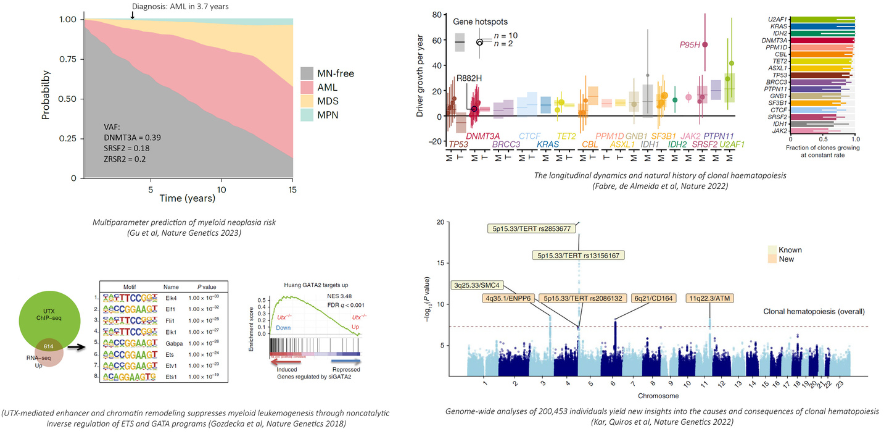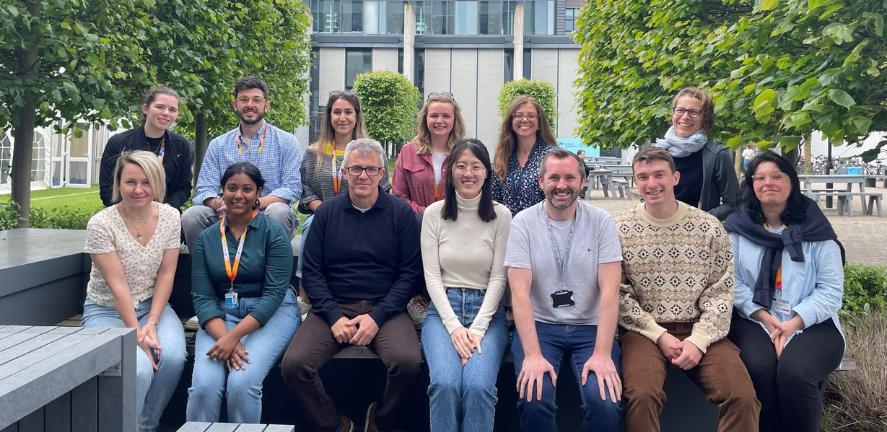Professor George Vassiliou
Leukaemic & preleukaemic haemopoietic stem cells
Email: gsv20@cam.ac.uk
Laboratory: Cambridge Stem Cell Institute, Jeffrey Cheah Biomedical Centre
Departmental Affiliation: Haematology
Biography
George Vassiliou is Professor of Haematological Medicine at the University of Cambridge, Cancer Research UK Senior Fellow and Consultant Haematologist at Cambridge University Hospitals. He studied Medicine at the Royal London Hospital and trained as a Haematologist in London and Cambridge. He obtained his PhD from the University of Cambridge in 2005 and went on to investigate the pathogenesis of acute myeloid leukaemia as a Cancer Research UK Clinician Scientist in Allan Bradley’s lab at the Wellcome Sanger Institute. He became a Wellcome Senior Fellow and a member of faculty at the Sanger Institute in 2011 and moved to the Cambridge Stem Cell Institute in 2019.
Funding
Cancer Research UK, Wellcome, European Research Council, Leukaemia Lymphoma Society, Rising Tide Foundation for Clinical Cancer Research, Kay Kendall Leukaemia Fund, Bloodwise, EMBO and the NIH-OxCam Scholars Program.
Research
The Vassiliou Group seeks to understand the cell-autonomous and cell-non-autonomous processes involved in transformation of normal to leukaemic haemopoietic stem cells and to identify genetic vulnerabilities of myeloid malignancies that can be exploited as targets of novel anti-leukaemic therapies.
To achieve these aims the group uses three main approaches:
- Application of genetic screens to identify and investigate genetic vulnerabilities of acute myeloid leukaemia and related cancers in order to develop new therapeutic approaches
- Generation and study of bespoke mouse models of somatic mutation drivers of myeloid malignancies, in order to define their molecular, genomic and phenotypic effects on haemopoietic stem and progenitor cells
- Detection and tracking of the evolution of clonal haematopoiesis in healthy individuals, in order to understand the factors involved in leukaemic progression and develop new approaches for early detection.
Vassiliou Group photo
Plain English
Blood stem cells live in the bone marrow and are responsible for the production of the cells of the blood and the immune system. Like all cells, blood stem cells accumulate random DNA mutations with time in every one of us. Unfortunately, in some people these changes affect genes that make the stem cells grow uncontrollably leading to the development of Acute Myeloid Leukaemia (AML), an aggressive cancer that kills more than 7 out of 10 sufferers. Our group investigates many aspects of AML from how it develops, how we can identify people at risk and how gene mutations change AML cells to make them grow abnormally. Importantly, we have also developed approaches to identify the genetic "weaknesses" of AML in order to develop new treatments against this and related cancers.
Selected Publications
- Vassiliou, G. Telomere Length and Clonal Hematopoiesis. N Engl J Med (2023).
- Gu, M. et al. Multiparameter prediction of myeloid neoplasia risk. Nat Genet (2023).
- de Almeida, J. G. et al. Computational analysis of peripheral blood smears detects disease-associated cytomorphologies. Nat Commun 14, 4378 (2023).
- Cheloor Kovilakam, S. et al. Prevalence and significance of DDX41 gene variants in the general population. Blood (2023).
- Kar, S. P. et al. Genome-wide analyses of 200,453 individuals yield new insights into the causes and consequences of clonal hematopoiesis. Nat Genet 54, 1155-1166 (2022).
- Fabre, M. A. et al. The longitudinal dynamics and natural history of clonal haematopoiesis. Nature 606, 335-342 (2022).
- Fabre, M. A. et al. Concordance for clonal hematopoiesis is limited in elderly twins. Blood 135, 269-273 (2020).
- Tzelepis, K. et al. SRPK1 maintains acute myeloid leukemia through effects on isoform usage of epigenetic regulators including BRD4. Nat Commun 9, 5378 (2018).
- Gozdecka, M. et al. UTX-mediated enhancer and chromatin remodeling suppresses myeloid leukemogenesis through noncatalytic inverse regulation of ETS and GATA programs. Nat Genet 50, 883-894 (2018).
- Abelson, S. et al. Prediction of acute myeloid leukaemia risk in healthy individuals. Nature 559, 400-404 (2018).
- Barbieri, I. et al. Promoter-bound METTL3 maintains myeloid leukaemia by m(6)A-dependent translation control. Nature 552, 126-131 (2017).
- Tzelepis, K. et al. A CRISPR Dropout Screen Identifies Genetic Vulnerabilities and Therapeutic Targets in Acute Myeloid Leukemia. Cell Rep 17, 1193-1205 (2016).
- McKerrell, T. et al. Leukemia-associated somatic mutations drive distinct patterns of age-related clonal hemopoiesis. Cell Rep 10, 1239-1245 (2015).
- Vassiliou, G. S. et al. Mutant nucleophosmin and cooperating pathways drive leukemia initiation and progression in mice. Nat Genet 43, 470-475 (2011).




